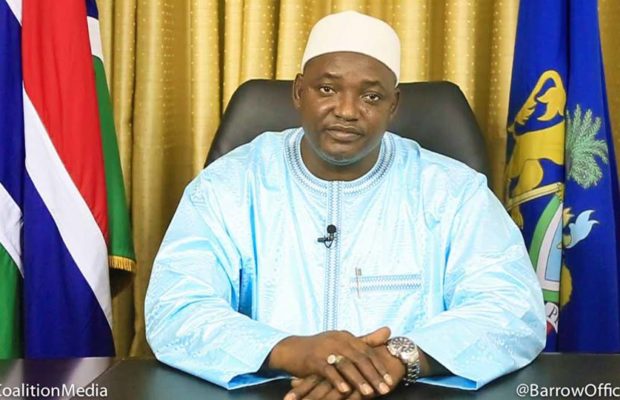Dr. Ousman Gajigo
The Ministry of Finance and Economic Affairs recently released the 2025 budget. Before discussing the substance of its content, it is important to highlight the fact that even the timeliness of its release has been mishandled. This is inexcusable since the preparation and the release of the budget document is a highly regular process that a serious government should have no problem executing. The fact that the Ministry released the budget later than they are legally required to do is symptomatic of the incompetence that is characteristic of the Adama Barrow regime.
Moving on the substance of the budget, the public financesituation is increasingly dismal. In looking at the budget, it isobviously important to scrutinize the revenue and the expenditure sides carefully. But before even delving into the details of the current budget, it is also important to address a few preliminary issues that apply to each and every budget under this government.
The first of those issues is that of credibility of the Gambian government budget. Despite the support of development partners in implementing medium term expenditure framework, there is serious lack of budget credibility. This means that what the government projects in terms of its revenues and expenditures differ significantly from what actually ends up happening. So, in a way, it is almost pointless to spend too much time in analyzingthe budget presented by the Ministry of Finance. But this is what we have to work with.
Secondly, most of the criticisms that were leveled against previous budgets, such as the 2024 version, also apply to this budget. Specifically, there is a serious misallocation of resourcesin the 2025 budget, which reveals the lack of seriousness of this government in tackling our development problems. The first aspect of that misallocation is the outsized share going into recurrent as opposed to development expenditures. In the current budget, about63% is going into recurrent expenditures. While this is an improvement over previous budgets, we have a long way to go towards course correction.
Another aspect of the misallocation of resources is the large budget allocations to ministries and units that are economicallyand developmentally insignificant. Let’s me highlight a few examples of these misallocations.
The budget allocation to the State House in the 2025 budget is over D1 billion. This amount is significantly higher than the allocation to the National Assembly and the Judiciary combined (D780 million). Furthermore, this amount has been increasing significantly each single year since Adama Barrow has been elected. In fact, it represents an increase of 24% from last year’s allocation. This simply makes no sense and it is not consistent with the development priorities of the country.
There is simply no good argument as to why the allocation to the State House should be this high. After all, the functional units for all the sectors are in the ministries, where the government machinery should operate. So, there is also no reason why the 24% increase in allocation at the State House is reflective of functional need at the level of the executive. But we all know the reality behind the wasteful increase in budget to the State House. After all, we have seen President Adama Barrow increasing his so-called group of advisors, who are selected not based on any meaningful expertise or usefulness to the country’s development agenda but mainly based on political reasons.
Another major misallocation is the Ministry of Foreign Affairs,which has given a budget of D 2.4 billion. This is a huge amount of waste because it reflects a serious lack of prioritization. In the current situation in The Gambia, this ministry should not have any allocation that is close to even a D 1 billion. There are numerous sectors in The Gambia with far greater and more urgent needs for financing than continuing to support many of the bloated embassies around the world.
The budget of the Ministry of Foreign Affairs has increased by 34% from last year’s allocation. Does anyone believe that the importance of this ministry has increased by this degree from last year? While the budget allocations to the State House and the Ministry of Foreign Affairs increased by huge amount, important sectors have experienced decreasing or stagnant allocations. For example, the allocations to the Ministry of Infrastructure and Works have declined, while the allocation to the Ministry of Agriculture has increased by only a small amount.
As a result of this misallocation of resources, expenditure is being financed by excessive amount of foreign and domestic borrowing. The servicing of that debt has now exceeded D 11 billion, which is taking close to a third of the total budget.Furthermore, the share of our budget that is now going to debt service is also increasing since it accounted for a quarter of the budget last year. At this rate of increase, we are looking at the realistic possibility of debt service accounting for a mind-blowing 50% of our budget. It is noteworthy that the amount that is being spend on debt service is far higher than the allocation to any single ministry or sector.
With all of this background, it is interesting to hear how ourMinister of Finance (Seedy Keita) talks about our desperate debt situation. Minister Keita recently addressed the National Assembly members and referred to factors that are adverselyaffecting our budget situation such as depreciating currency, poor reporting of revenues from some ministries and limited tax base, among others.
What the Minister’s utterances revealed is that the incompetence of the Adama Barrow ministers never ceases to amaze. Minister Keita is talking about the problems in the government as if he is not part of it. The failure of other ministries to appropriately report on generated revenue is a failure of the Ministry of Finance in its central role in public finance management. The continuous slide in the value of the dalasi, which is not only increasing the cost of debt service but also increasing the cost of living, is a failure of economic policy, which is right under the control of Ministry of Finance. The limited tax base of the Gambia is the result of the absence of tax reform, which is a failure of the Ministry of Finance since the Gambia Revenue Authority is an agency under the Ministry of Finance.
Let me provide further concrete evidence on how the Minister Keita has failed in his responsibilities. Basic reforms in the tax revenue generation and public finance have not improved because he failed in his basic role as a responsible finance minister. The basis for the tax code is the GRA 2004, which means we have been operating under tax code that was passed over two decades ago under Yahya Jammeh. The existing Public Finance Act (2014), a critical part of public finance management, was also passed under Jammeh. Yet, Mr. Keita is uttering excuses as if he is oblivious to the central economic position he occupies in the Adama Barrow administration as the existing Minister of Finance.
The current economic predicament of the country is not the result of factors beyond the control of our policy makers. It is the inevitable result of conscious decisions by the top echelon of the Adama Barrow administration. The fact that they talk about our current economic problem as if its correction is beyond their control is evident of their unsuitability for the places they currently occupy.
The 2025 budget is a blueprint of economic mismanagement and clear evidence that the policies that have led us to this situation will continue. Unfortunately for the country, the president does not seem to be aware that he is driving the country towards an economic ditch. After all, the ministers and advisers around him either do not have the competence or driven by motivations that are at odds with the nation’s interest.





